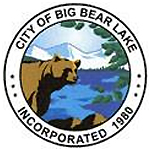 Though the Public Hearing with regard to increased sewer use and trash collection fees had been held at the Big Bear Lake City Council’s July 13 meeting, and these increases were scheduled to be adopted at last night’s meeting of Council, Councilmember Darrell Mulvihill expressed his objection, “If we pass this tonight, on top of other fees—DWP, Bear Valley Electric*—this is an awful lot for our citizens. I personally feel it’s the wrong time to ask for an increase.” Of the fee increases, 5% each for sewer and trash, which equates to $17 per household for sewer and $12 for refuse, both of which will be placed on the tax roll, City Manager Jeff Mathieu explained, “The 5% is related to the most basic thing that we do, and that’s our sewer infrastructure.” Due to a “top-notch” effort with regard to sewer lining projects, Mathieu added, “Our annual contribution back to BBARWA has been decreasing every year for four years. The 5% we have proposed is only for our own infrastructure. This is not for the purpose of increases, but our infrastructure and our services.” Councilmember Liz Harris, who also serves as the Chair of the Big Bear Area Regional Wastewater Agency, noted that years’ worth of lining old cement sewer lines within Big Bear Lake has actually resulted in reduced BBARWA costs for the City and that, given new mandates, any fraction of a spill results in large fines. “It’s not good fiscal management,” she said, “not to take care of our infrastructure.” The trash component of the increase is for continued services, Mathieu reiterated, and not due to an increase from Big Bear Disposal, who has renewed their contract with the City—and without raising rates. Given lengthy discussion on what could have been a quick vote on the agenda’s Consent Calendar, Councilmember Michael Karp did introduce one modification to the adoption, which will have to take place prior to August 10 in order to be placed on the next tax roll. That modification, to be voted on with the fee increases at an as-yet-unscheduled meeting, is that if BBARWA raises rates (which is not the plan, per Harris), these costs would be passed through to property owners over a two-year—rather than five-year—period, effective through July 2011.
Though the Public Hearing with regard to increased sewer use and trash collection fees had been held at the Big Bear Lake City Council’s July 13 meeting, and these increases were scheduled to be adopted at last night’s meeting of Council, Councilmember Darrell Mulvihill expressed his objection, “If we pass this tonight, on top of other fees—DWP, Bear Valley Electric*—this is an awful lot for our citizens. I personally feel it’s the wrong time to ask for an increase.” Of the fee increases, 5% each for sewer and trash, which equates to $17 per household for sewer and $12 for refuse, both of which will be placed on the tax roll, City Manager Jeff Mathieu explained, “The 5% is related to the most basic thing that we do, and that’s our sewer infrastructure.” Due to a “top-notch” effort with regard to sewer lining projects, Mathieu added, “Our annual contribution back to BBARWA has been decreasing every year for four years. The 5% we have proposed is only for our own infrastructure. This is not for the purpose of increases, but our infrastructure and our services.” Councilmember Liz Harris, who also serves as the Chair of the Big Bear Area Regional Wastewater Agency, noted that years’ worth of lining old cement sewer lines within Big Bear Lake has actually resulted in reduced BBARWA costs for the City and that, given new mandates, any fraction of a spill results in large fines. “It’s not good fiscal management,” she said, “not to take care of our infrastructure.” The trash component of the increase is for continued services, Mathieu reiterated, and not due to an increase from Big Bear Disposal, who has renewed their contract with the City—and without raising rates. Given lengthy discussion on what could have been a quick vote on the agenda’s Consent Calendar, Councilmember Michael Karp did introduce one modification to the adoption, which will have to take place prior to August 10 in order to be placed on the next tax roll. That modification, to be voted on with the fee increases at an as-yet-unscheduled meeting, is that if BBARWA raises rates (which is not the plan, per Harris), these costs would be passed through to property owners over a two-year—rather than five-year—period, effective through July 2011.
*Just a note: fee increases for DWP and BVES have been discussed, at different stages, though neither has been approved. Stories on these potential rate increases have since been posted on July 29 (DWP) and July 30 (BVES).


